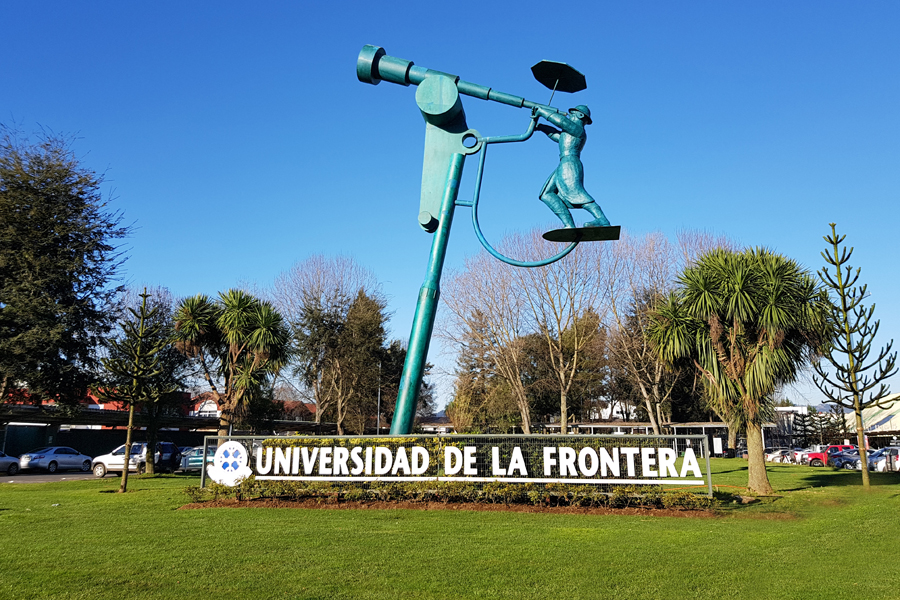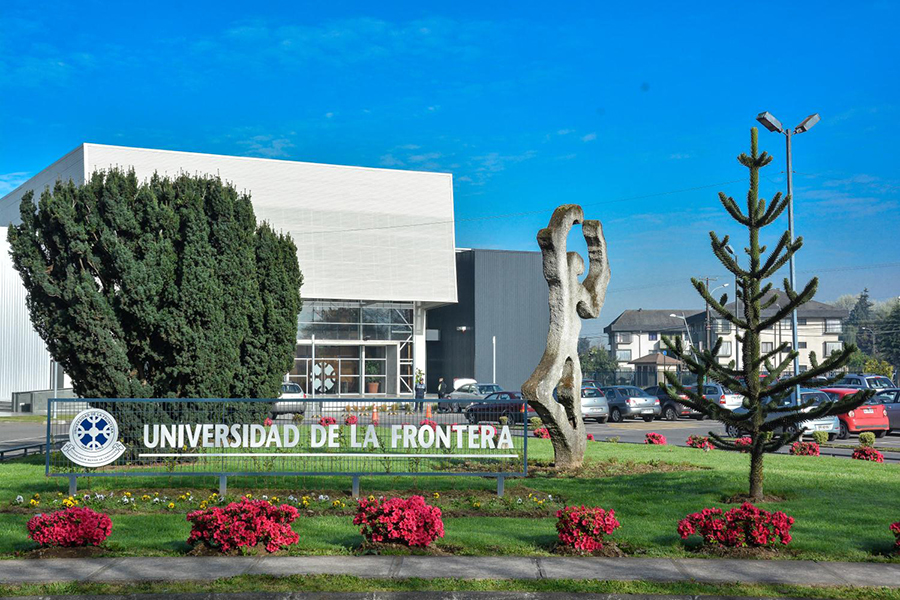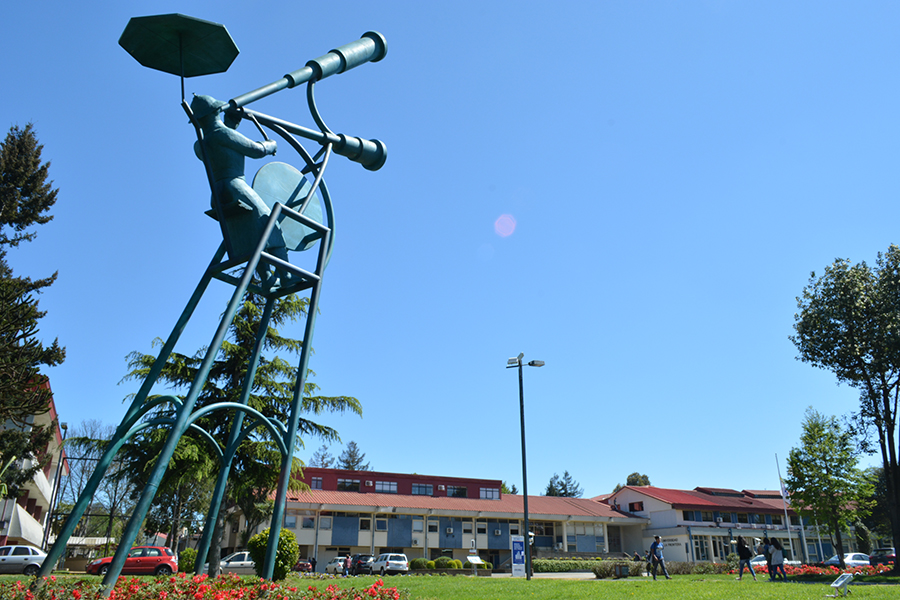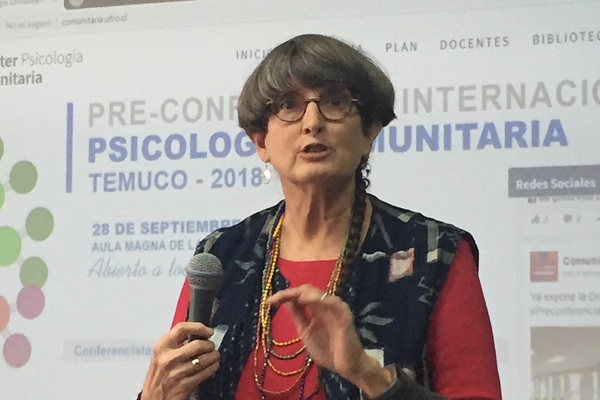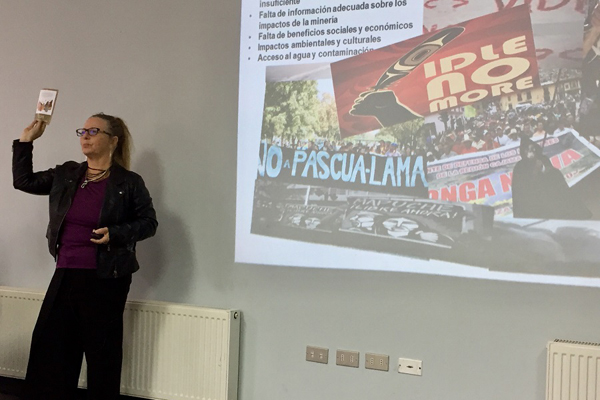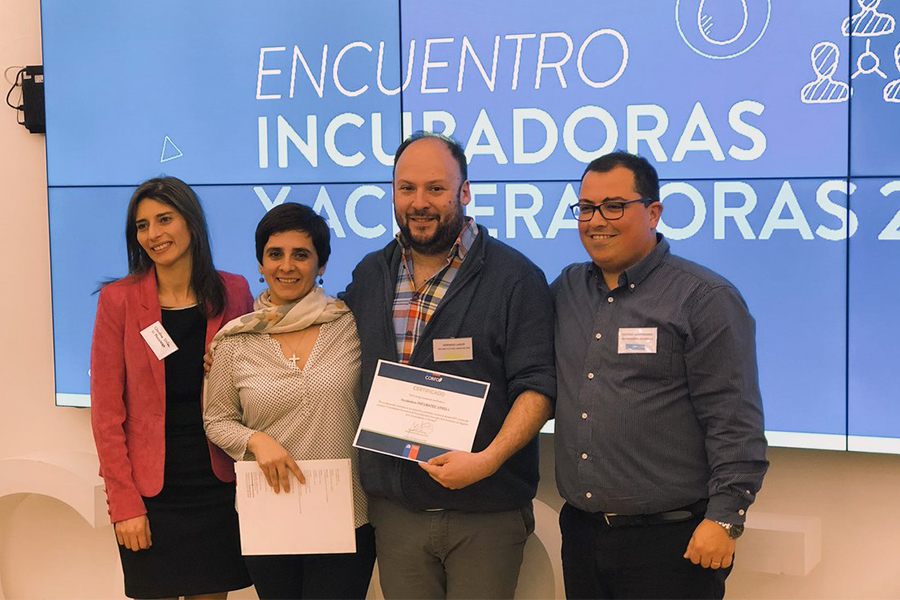|
It is a milestone in the history of accreditation for regional state universities and a mayor success for the Araucanía Region. |
The Universidad de La Frontera is accredited for 6 years and achieved to enter the group of universities of excellence, a category that includes all institutions that are accredited for 6 or 7 years.  Written by: Communications Office Written by: Communications Office |
|
The items that were evaluated best are Accreditation with 86.2% and Research with 78.4%. Nine UFRO programs are among the top ten in Chile. Nursing and Nutrition are in third place among 34 national universities. These figures made it possible that this institution climbed from place 13 last year to place 11 in the report 2018. |
The Universidad de La Frontera climbed from place 13 to 11 according to the report of the América Economía Ranking 2018. Mainly, this achievement is the result of systematic work and the determination this educational institution has in order to keep improving each day. According to information from the Division of Analysis and Institutional Development (DADI), one of the reasons the UFRO climbed up is that the indicators Teaching Quality and University Life improved. In this regard, the ranking positively takes the areas for sports and physical activity into account, such as sports courts, gyms, athletic tracks, besides of all activities that are linked with sports and the students´ recreation. The dimensions the Ranking considered are: Teaching Quality, Student Quality, Research, Accreditation, Infrastructure and Efficiency, Internationalization, Inclusion and Diversity, Community Outreach, and University Life. ACCREDITATION AND RESEARCH Another important indicator is Accreditation in which the academic offer of this educational institution is among the ones with the highest ratings, as well as the Universidad de Talca and the Universidad de los Andes. The item Research, although it has had a decrease compared to last year by almost three points, keeps being within the ones with the best average and has an even better score than most of the other top ten universities. The Universidad de La Frontera´s researchers´ work also shows in the large number of WOS publications – a total of 1570 – between 2014 and 2016. LEADING UNDERGRADUATE PROGRAMS Nursing and Nutrition are in third place out of 34 judged universities, with excellent indicators of seven and six years of accreditation, apart from a strong academic body and an employment rate of 99% in the case of the Nursing program. RANKING OF THE UNDERGRADUATE PROGRAMS The América Economía Ranking analyzed 16 undergraduate programs at 34 universities. The UFRO programs that achieved to be among the top 10 are: Agronomy, Nursing, Civil Industrial Engineering, Medicine, Nutrition and Dietetics, Dentistry, Psychology, Sociology and Civil Electrical Engineering. FUTURE IMPROVEMENTS It is important to note that there are aspects that have to be improved. Mainly, the item Community Outreach, which has the weakest score in the report. According to Dr. Ricardo Herrera, director of DADI, this indicator clearly shows where to put more efforts. “This is an invitation to non-compliance, to keep working, particularly on the contact and link with the community of Temuco and our region. This is not about working in order to appear in the rankings. It is about knowing with certainty in which field we have to work harder. Simultaneously, we have to keep strengthening research as one of the keys for growth.” The Psychology and Dentistry programs, both among the top five in relation to the simile at the national level, have a common denominator with a low score: the item Prestige. This item is based on the survey that has been randomly sent to a group of university professors of each institution. The scores on this item are between 10 and 27 points, except for the Sociology program which, although being in the eighth position with respect to the top ten, marks a score of 35.5. For the purpose of this report, the item Prestige is weighted by 20% and it is of crucial importance that the academics who receive this survey each year answer in a way that evaluates and recognizes the programs by the work that has been done.  Written by: Division of Analysis and Institutional Developments Written by: Division of Analysis and Institutional Developments |
|
In 2019, this institution will execute seven projects that will strengthen its international links and joint collaborative work. It is the second year in a row in which the UFRO reaches a leading position in this national competition. |
The Universidad de La Frontera celebrates a major success again. As well as in 2017, it is in second place regarding the number of projects and resources it acquired in the latest Competition for the Attraction of International Advanced Human Capital, Modality Short Stays-MEC, by Conicyt.
 Written by: Jassna Sepúlveda B. /Sergio Valenzuela S. Written by: Jassna Sepúlveda B. /Sergio Valenzuela S.Communications Office |
|
Indigenous rights, the relation between the extractive industry and the loss of a national identity, psychology as an agent of change in disaster situations – these were some of the issues presented in the International Pre-conference of Community Psychology at the Universidad de La Frontera. |
Five renowned professionals were present in this event, which was the prelude for the seventh International Conference of Community Psychology in Santiago on October 4th to 7th. Apart from presenting the most recent results of their research work, they contributed to the debate that just started in our region after the launch of the Araukanía Promotion Plan. The event is the result of the efforts of the Universidad de La Frontera, Temuco Catholic University and University of Santo Tomás and they brought Dr. Terry Mitchell, an academic of the Wilfried Laurier University in Canada, Dr. Brinton Lykes of the Boston College in the USA, Irma Serrano and David Pérez Jiménez from Puerto Rico and the Cuban psychologist Carmen Nora Hernández to the UFRO in order to participate in seminars, workshops, conversations, and visits to the Mapuche Community, between September 29th and October 2nd. They participated in the practice-based seminar “Social coexistence and human rights: contributions from community psychology”, which was the inaugural event of this Pre-conference of Community Psychology. Dr. Mitchell, who was recently honored for her contribution to the study on indigenous rights in the Canadian context, was one of the speakers and gave an account of the increase in deaths of indigenous leaders while defending their territories. This was one of the conclusions presented at the conference “Indigenous rights and community psychology: Historical traumas and extractive projects”, a topic that, according to Dr. Mireya Palavecinos, director of the UFRO Master´s Program in Community Psychology, “is very important regarding the very contingent facts that take place these days in our country, and especially in our region considering the Araukanía Promotion Plan, which has just been presented and which poses a number of challenges regarding productive issues as well as the relationship with the Mapuche People. Canada is very advanced in this point.” The series of expositions showed the reality of community psychology as a special discipline in the treatment of social situations that get complex according to the local realities. One of those expositions was about gender-based violence, presented by Dr. Lykes, or the consequences Puerto Rico had to deal with after Hurricane María and that affected its population of almost three million people, or the political reality in Cuba after opening up to the US market. It was an academic event that brought professionals in social science and community leaders together and that fulfilled the objective of decentralizing the 7th International Conference of Community Psychology. It brought the Chilean Society of Community Psychology and a network of academic teams from 16 Chilean universities, which has been operating in Chile for more than 10 years and includes the Universidad de La Frontera, to our region. Apart from that, considering that in the 90´s new social problems came up in Chile which challenged psychology, such as discrimination, children´s rights, or policies for people living in extreme poverty, the psychologists started to work in multidisciplinary work teams in programs that permitted them to work in direct contact with the affected families. And, today, they have the UFRO in the south, as a reference for the work with vulnerable sectors and the creation of human capital regarding prevention and the development of public policies which are dealing with these issues.
|
|
IncubatecUFRO was recognized as the best in Chile, regarding the sales of its portfolio of entrepreneurs in 2017. |
You can find the best business incubator in Chile in the Araucanía Region and it is called IncubatecUFRO. It was recognized by the Production Development Corporation (CORFO), which awarded the incubator and accelerator of the Universidad de La Frontera for being the best in Chile, regarding the sales of its portfolio of entrepreneurs in 2017.
 Written by: Dirección de Comunicaciones Written by: Dirección de ComunicacionesThis email address is being protected from spambots. You need JavaScript enabled to view it. |





